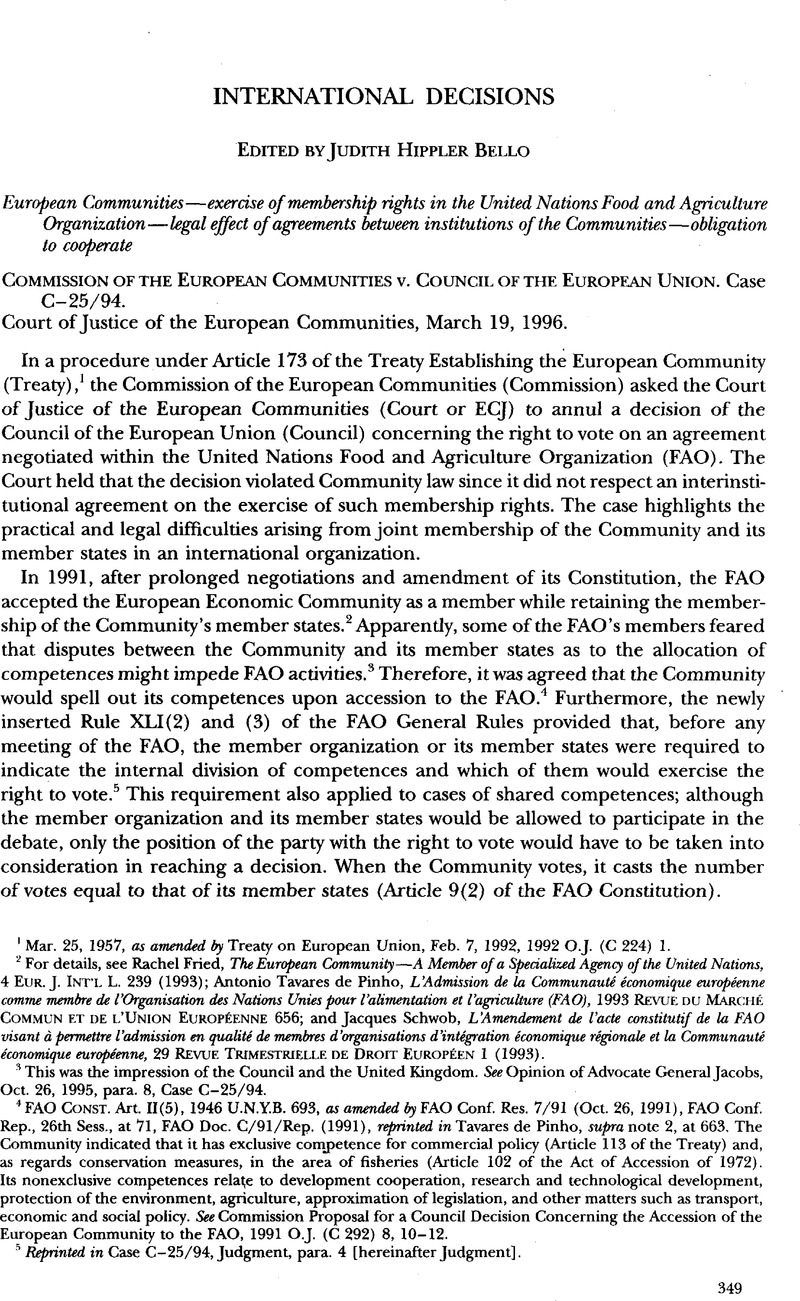No CrossRef data available.
Published online by Cambridge University Press: 27 February 2017

1 Mar. 25, 1957, as amended by Treaty on European Union, Feb. 7, 1992, 1992 O.J. (C 224) 1.
2 For details, see Fried, Rachel, The European Community—A Member of a Specialized Agency of the United Nations , 4 Eur. J. Int ’ l L. 239 (1993);Google Scholar Antonio Tavares de Pinho, L’Admission de la Communauté économique européenne comrne membre de l’Organisation des Nations Unies pour l’alimentation et l’agricuUure (FAO), 1993 Revue du Marché Commun et de l’U nion Europeenne 656; and Jacques Schwob, L’Amendement de l’acte constitutif de la FAO visant à permettre l’admission en qualité de membres d’organisations d’integration économique régionale et la Communauté économique européenne, 29 Revue Trimestrielle de Droit Européen 1 (1993).
3 This was the impression of the Council and the United Kingdom. See Opinion of Advocate General Jacobs, Oct. 26, 1995, para. 8, Case C–25/94.
4 FAO Const. Art. 11(5), 1946 U.N.Y.B. 693, as amended by FAO Conf. Res. 7/91 (Oct. 26, 1991), FAO Conf. Rep., 26th Sess., at 71, FAO Doc. C/91/Rep. (1991), reprinted in Tavares de Pinho, supra note 2, at 663. The Community indicated that it has exclusive competence for commercial policy (Article 113 of the Treaty) and, as regards conservation measures, in the area of fisheries (Article 102 of the Act of Accession of 1972). Its nonexclusive competences relate to development cooperation, research and technological development, protection of the environment, agriculture, approximation of legislation, and other matters such as transport, economic and social policy. See Commission Proposal for a Council Decision Concerning the Accession of the European Community to the FAO, 1991 O.J. (C 292) 8, 10–12.
5 Reprinted in Case C–25/94, Judgment, para. 4 [hereinafter Judgment].
6 The Arrangement is dated December 19, 1991, but is not officially published. It is reprinted, in part, in Judgment, paras. 6–7.
7 The nonvoting party or parties may speak, too, but only in support of the common position. If, however, a common position cannot be reached, the member states are free to speak and vote (sec. 2.4), as reported in Opinion of Advocate General, supra note 3, para. 13.
8 Nov. 24, 1993, 33 ILM 968 (1994).
9 Judgment, para. 17. The Advocate General cited slightly different wording (“ought normally to have been approved”). This difference seems to stem from the translation of the judgment, which was originally in French as the language of the procedure. Both French versions (the Advocate General’s being a translation from English) are identical (“aurait dû normalement être approuvé”).
10 Id., para. 18.
11 The Court referred to Case 22/70, Commission v. Council (AETR), 1971 ECR 263, para. 42.
12 The Court has repeatedly confirmed that obligation. See Ruling 1/78, Draft IAEA Agreement, 1978 ECR 2151, paras. 34–36; Opinion 2/91, ILO Convention No. 170, 1993 ECR I–1061, para. 36; and Opinion 1/94, Draft WTO Treaty, 1994 ECR I–5267, para. 38.
13 The Court referred to its judgments in Joined Cases 3/76, 4/76 and 5/76, Criminal proceeding against Cornelis Kramer, 1976 ECR 1279, para. 33; and Case C–405/92, Mondiet v. Islais, 1993 ECR 1–6133, para. 12.
14 See AETR, 1971 ECR 263, para. 42.
15 Opinion of Advocate General, supra note 3, paras. 56–59.
16 For the importance of this consideration in practice, see Jörn Sack, The European Community’s Membership of International Organizations, 32 Common Mkt. L. Rev. 1227, 1232–33 (1995).
17 See Joël Rideau, Les Accords internationaux dans la jurisprudence de la Cour de Justice des Communautés européennes, 94 Revue Générale de Droit International Public 289, 405–08 (1990); and Navidad Fernández Sola, Quelques Aspects de la participation de la Communauté européenne aux enceintes internationales et aux accords multilatéraux, 20 Polish Y.B. Int ’ l L. 209, 218 (1993).
18 See, e.g., Sack, supra note 16, at 1253, 1256, for this type of arrangements; similarly, P.J. G. Kapteyn & Pieter Verloren van Themaat , Introduction to the Law of the European Communities 224 n.174, 228 n.192 (2d ed. 1989), for arrangements on budgetary discipline. Rudolf Streinz , Europarecht 142 (2d ed. 1995), regards such arrangements as binding but doubts their justiciability.
19 Opinion of Advocate General, supra note 3, paras. 73 & 69, respectively.
20 Under Article XI(1) of the WTO Agreement, Apr. 14, 1994, 33 ILM 1144, 1150 (1994), the EC is an original member of the organization, as are its member states as contracting parties to GATT 1947.
21 An overview is given by Sack, supra note 16, at 1240–43.
22 This was recognized by the ECJ in the AETR case, 1971 ECR 263, para. 86.
23 Opinion 1/94 (WTO), 1994 ECR 1-5267, para. 89.
24 As called for, e.g., by the Commission. See Commission Opinion “Reinforcing Political Union and Preparing for Enlargement,” COM(96)0090 final, para. 26.